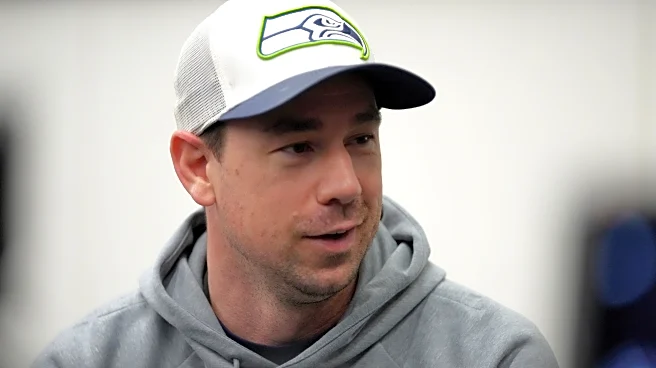What's Happening?
Volleyball, invented in 1895, has become a popular sport in the United States, particularly among high school and college girls, according to the USA Volleyball Foundation. The sport is not only exciting but also offers numerous mental and physical health benefits. Erica Morgan, head girls' volleyball coach at Cedar Valley High School in Utah, explains that volleyball requires teamwork and teaches selflessness and responsibility. Dr. Chantal Nguyen from Stanford Medicine highlights the cardiovascular benefits of volleyball, noting its ability to lower blood pressure, decrease cholesterol, and improve glucose tolerance. The sport also engages various muscle groups, enhancing strength and toning, while improving flexibility, agility, and coordination. Volleyball is linked to improved cognitive function, confidence, resilience, and leadership skills, fostering social bonds and reducing stress and anxiety.
Why It's Important?
The health benefits of volleyball extend beyond physical fitness, impacting mental health and social well-being. The sport's ability to improve cardiovascular health and muscle strength can contribute to long-term health benefits, reducing the risk of conditions like osteopenia and osteoporosis. Volleyball's emphasis on teamwork and communication can enhance social skills and psychological safety, which are crucial for mental health. The sport's popularity among youth suggests it could play a significant role in promoting healthy lifestyles and reducing depression and anxiety. As volleyball continues to grow in popularity, its potential to foster community and improve overall well-being becomes increasingly significant.
What's Next?
As volleyball's popularity rises, schools and communities may invest more in facilities and programs to support the sport. This could lead to increased participation and further research into its health benefits. Coaches and health professionals might focus on optimizing training and safety practices to maximize the sport's benefits while minimizing injury risks. The growing interest in volleyball could also lead to more competitive opportunities and the development of youth leagues, fostering talent and encouraging healthy competition.
Beyond the Headlines
Volleyball's impact on social and psychological health highlights the importance of team sports in fostering community and personal growth. The sport's ability to teach life skills such as leadership and resilience can have long-term benefits for participants, influencing their academic and career success. As more people recognize these benefits, volleyball could become a model for integrating physical activity with mental and social development in educational and recreational settings.


![Daily Slop: 12 Feb 26 – New Commanders OC David Blough: “How do we get Terry [McLaurin] 10 targets a game?“](https://glance-mob.glance-cdn.com/public/cardpress/binge-magazine-card-generation/spaces/US/en/sb-nation/images/ppid_2cf3d240-image-177091266842313096.webp)






